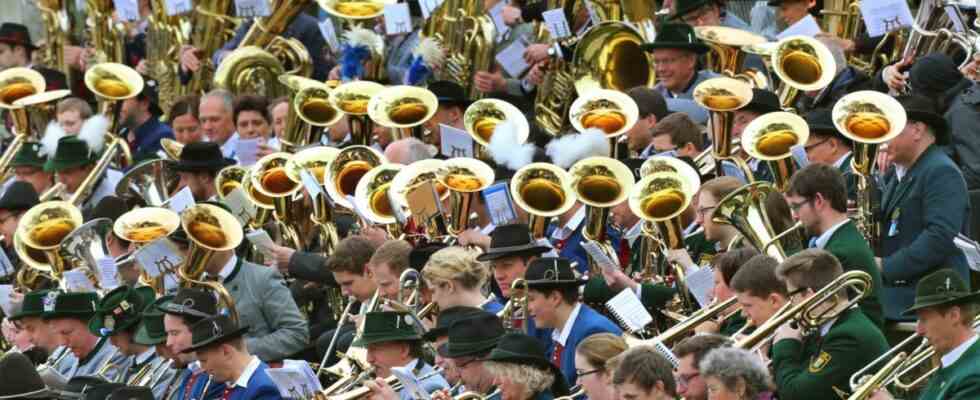It is undisputed that the corona restrictions have massively affected the lives of people in Bavaria. What is only a memory for most people still has a dramatic effect on many of the approximately 7,000 music and theater ensembles in the Free State. On Wednesday, representatives of amateur music bands, choirs, pop music and orchestras described in the science committee of the state parliament what problems the 600,000 amateur musicians and amateur actors in Bavaria are struggling with.
All experts complained about the strict restrictions during the lockdowns. Their members were often no longer able to understand when and why the rules were relaxed for whom. The clubs feel disadvantaged, especially in comparison to sport. At that time, Prime Minister Markus Söder (CSU) was still playing in the “Team Caution” and also tested the patience of the CSU parliamentary group. Which probably prompted the committee chairman Robert Brannekämper (CSU) to a rather half-hearted defense: “Corona came without a blueprint, but the regulations were not always very plausible for us in the parliamentary group either.” The parliamentary group commissioned an aerosol study to “also give the state government a certain amount of help as to what makes sense and what doesn’t”.
The biggest problem facing amateur choirs, orchestras and theater ensembles has been exacerbated by Corona: the number of members is falling. In addition, there is a massive shortage of young people, because for two years there were hardly any music or theater lessons in day-care centers and schools. All experts complained that many older volunteers are staying away or will retire in the foreseeable future for reasons of age and that the clubs can hardly get hold of children. But they are essential to secure the future and to get audiences for performances. When children are on stage, parents and grandparents sit in the audience – or get involved right away.
According to Andreas Horber, Managing Director of the Bavarian Music Council, many clubs have lost up to 20 percent of their members. There are currently more choirmasters and conductors being searched for in association magazines than ever before. Many would have quit or taken on other jobs. The loss of members and conductors has now led to music ensembles giving up completely or having to rework their repertoire. His colleague Andreas Kleinhenz from the North Bavarian Music Association reported that many club leaders also want to quit. Kleinhenz calls Corona a “fire accelerator”, many of the problems have already existed before.
Even though orchestras and choirs are now rehearsing again, the consequences are still noticeable in schools and daycare centers, the experts complained. Projects such as choir or brass classes were discontinued due to Corona and have not yet been relaunched. For the future of the clubs and the musical education of the children, the experts called for better access to primary and secondary schools as well as to day-care centers. There is an urgent need for fixed framework conditions, such as music and theater associations are allowed to get involved there. Or criteria for who headmasters can employ. It is a problem that there is no longer any musical offer in the educator and teacher training. “If that doesn’t happen in training, how is the teacher supposed to sing with the children without making a fool of himself?” asked Horber.
The amateur music associations campaigned to be allowed to get involved in the training and further education of educators and teachers. Especially now, in times of a shortage of educators and teachers, music teachers or established ensemble leaders could help out in daycare centers and schools. With that, they should break open doors with the big day care providers. Social Affairs Minister Ulrike Scharf (CSU) had already signaled that specially trained career changers in daycare centers are conceivable. The Ministry of Culture is also open to SZ inquiries: For three years, musicians and especially music teachers have been able to work as subject teachers at primary and secondary schools. In addition, clubs have long been involved in schools as part of the all-day school program. According to the Ministry of Education, cooperations of all kinds are possible. There is also a music action day and an annual brochure with songs from the state coordination office for music, in which the music council is also involved.
At the end there is also self-criticism
Financial problems were not in the foreground in the state parliament hearing, although the reserves of many clubs were almost exhausted, but subsidies from the Free State for music lessons for children were more important to the club representatives. So far, many clubs have financed music lessons through parental fees or from their own budget, but this is no longer possible in the medium term. And the concern is that rising energy and living costs are causing families to drop their children because music lessons and instrument rentals are too expensive.
In addition to the concerns about young talent, the associations were also concerned with the question of how they could bring their audience back. As with the big professional stages, there are hardly any full halls, it said. But in the discussion with the MPs, the associations were also self-critical: You have to think about completely new types of events, go out and address other people than just inviting those to the concert who already like you anyway.

